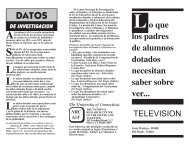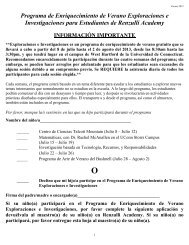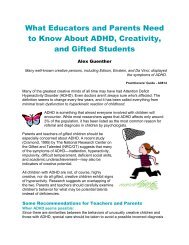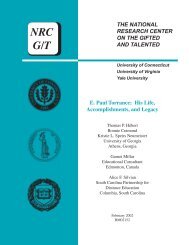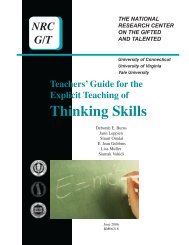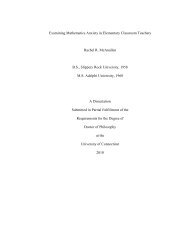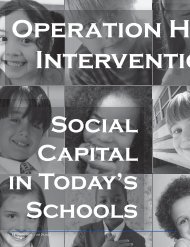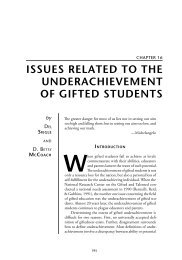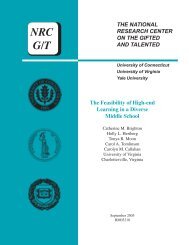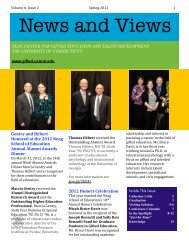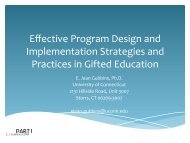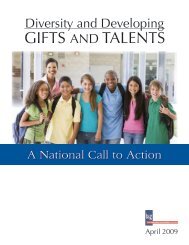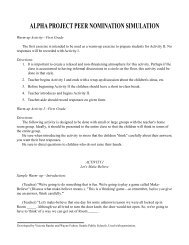Giftedness and High School Dropouts - Neag Center for Gifted ...
Giftedness and High School Dropouts - Neag Center for Gifted ...
Giftedness and High School Dropouts - Neag Center for Gifted ...
You also want an ePaper? Increase the reach of your titles
YUMPU automatically turns print PDFs into web optimized ePapers that Google loves.
were defined more flexibly as those who participated in their school district's gifted<br />
program or who had been enrolled in three or more classes in advanced, enriched, or<br />
accelerated English, social studies, science, or math. Among 1,285 students who<br />
completed the Second Follow-up Dropout Questionnaire, 334 were identified as gifted.<br />
The sample in Study 2 consists of gifted students who were eighth graders in 1988<br />
<strong>and</strong> participated in all four rounds of the survey. It should be noted that gifted students<br />
who dropped out of school in Study 1 <strong>and</strong> Study 2 are not exactly the same group,<br />
because some of the students who dropped out of school in Study 1 might have returned<br />
to school be<strong>for</strong>e the third follow-up, classifying them as non-dropouts in Study 2. Also,<br />
gifted students who dropped out of school in Study 1 did not participate in the third<br />
follow-up survey, thus decreasing the number of students in the third follow-up. Among<br />
12,625 students who participated in the four rounds of the survey, a total of 3,520 gifted<br />
students were identified as a sample using the same definition of gifted as in Study 1. In<br />
Study 2, dropout students were defined as students who were not graduates or<br />
GED/certificate holders (f3diplom=6) in 1994.<br />
Weights <strong>and</strong> St<strong>and</strong>ard Error of the Study<br />
To compensate <strong>for</strong> unequal probabilities of sample selection <strong>and</strong> to adjust <strong>for</strong> the<br />
non-response effect, an appropriate weight was used <strong>for</strong> data analyses. Also, all<br />
estimates, st<strong>and</strong>ard errors, <strong>and</strong> significant test results were calculated based on the sample<br />
design. For this study, SPSS (Statistical Package <strong>for</strong> the Social Sciences) <strong>and</strong> the<br />
SUDAAN (Software <strong>for</strong> Statistical Analysis of Correlated Data) statistical program from<br />
the Research Triangle Institute (1995) were used to estimate the st<strong>and</strong>ard errors, taking<br />
into account the complex survey design.<br />
Data Analyses <strong>and</strong> Results<br />
Study 1<br />
Research Question 1: What are gifted dropouts' reasons <strong>for</strong> leaving school,<br />
what are parents' reactions to their leaving school, what activities accounted <strong>for</strong><br />
their time, what are their relationships with parents <strong>and</strong> peers, <strong>and</strong> what are their<br />
future career plans<br />
Several descriptive data analyses were conducted to gain more specific<br />
in<strong>for</strong>mation about gifted students who dropped out of school regarding: (a) reasons <strong>for</strong><br />
leaving school, (b) parents' reactions, (c) time spent using a computer, (d) time spent<br />
working on hobbies, (d) time spent doing volunteer work, (e) time spent talking with<br />
friends, (f) time spent talking with parents, <strong>and</strong> (g) future career plans.<br />
Regarding reasons <strong>for</strong> leaving school, results indicated that the majority of the<br />
gifted males left school because they were failing school, they got a job, they couldn't<br />
keep up with their schoolwork, <strong>and</strong> they didn't like school. <strong>Gifted</strong> females reported that<br />
x



